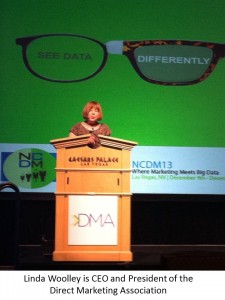 When you value something, it’s worthwhile. It’s desirable, important or useful. An activity that’s worthwhile is one that creates value in some way, and therefore should be safeguarded.
When you value something, it’s worthwhile. It’s desirable, important or useful. An activity that’s worthwhile is one that creates value in some way, and therefore should be safeguarded.
That’s the premise behind a landmark study commissioned by the DMA's Data-Driven Marketing Institute called, The Value of Data: Consequences for Insight, Innovation and Efficiency in the U.S. Economy. The study was released on October 14, 2013 and was conducted by Professors John Deighton of Harvard Business School and Peter Johnson of Columbia University.
The purpose of the study is to inform government policymakers of what’s at stake if legislation is considered that would impede the flow and use of data in the marketing economy by quantifying:
- How much incremental value data-driven marketing contributes to the U.S. economy, and
- How much of this value is accounted for by the flow/transfer of data between firms.
Findings of the study
Even with conservative measures, the study’s findings show the data-driven marketing economy (DDME):
- Added $156 Billion in revenue to the U.S. economy and fueled more than 675,000 jobs in 2012 alone,
- Has 70% of its value ($110 Billion and 478,000 jobs) dependent on the ability of firms to exchange data.
- As a result, the real value of data in marketing is in its application and exchange across the DDME.
Why marketers should care
While the study itself is impressive, the reason the study is needed is why marketers should care and should focus on value creation.
The legislation being considered is driven by concerns regarding the misuse of data collected on individuals, which has been fueled by press stories equating data-driven with “creepiness.” These sentiments have been most sensationally fueled by the revelations made by Edward Snowden in relation to the NSA.
The Snowden Affair comes at a time when:
- Our lives are increasingly lived online, or facilitated by online and mobile applications and services,
- Technology has evolved to enable data collection and storage on vast amounts of transactional and behavioral phenomena (commonly known as “big data”),
- Analytics can unlock the value of big data by enabling conclusions and predictions previously hidden to become available and commercially applicable.
Most importantly, the scales of communication have tipped decidedly in favor of the empowered consumer – evidenced by the vast amount written about how companies are no longer in control of their brands.
Three steps to create value:
All this creates a “perfect storm” that compels all marketers to be mindful of what they do and how it affects their audiences. We should broaden the notion of value to include the value our customers derive from freely giving us their data – and focus on creating and promoting that value. Specific steps we can take include:
- Take an active part in data stewardship and data governance, and if possible get training. Customer data is valuable and in the words of SAS CMO Jim Davis, we’d do well to treat data like money.
- Don’t annoy your customers. Heed laws such as “CAN-SPAM” and “Do Not Call” and make active use of opt-ins and enable easy opt-outs.
- Commit to good marketing practices, such as the 10 Guidelines and Principles for DMA Membership and Online Behavioral Advertising Guidelines.
In her keynote address at the NCDM 2013 conference, DMA CEO and President Linda Woolley reminded the audience that data-driven marketers hold the keys to the customer data that should inform all business decisions and we should be involved at all stages. Involvement in this way is how we create value for our organizations because in-depth customer knowledge is the key to growth. And it happens by delivering the best customer experience, built on loyalty and trust from anticipating and meeting customer needs.
I encourage you to download the research report, read it and share it with others. Speak up, get involved within your own organization and by all means try to make your marketing valuable to your customers. We all lose when we annoy or creep out our customers.
